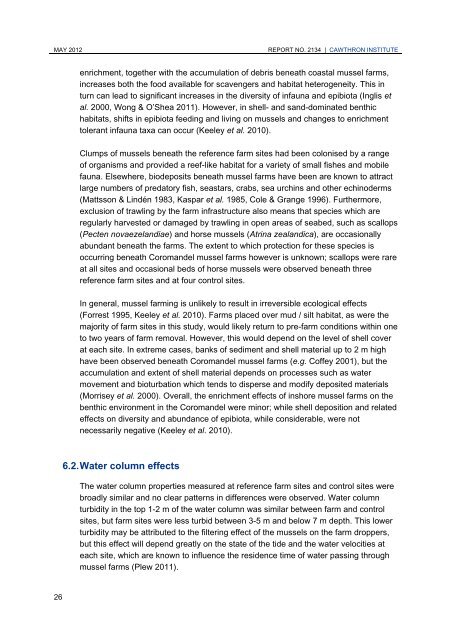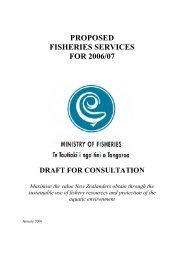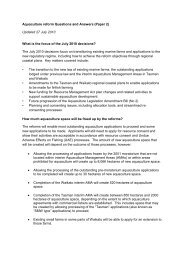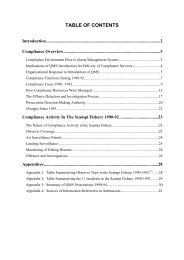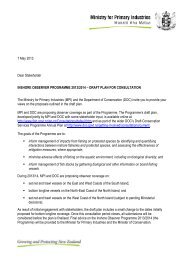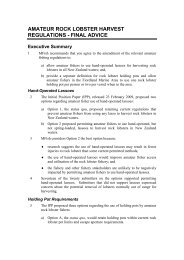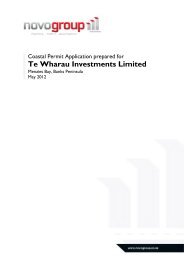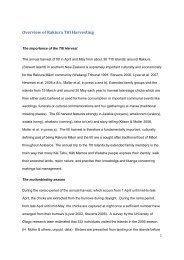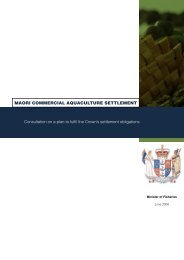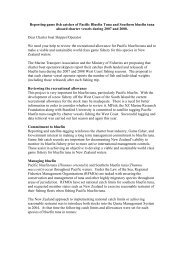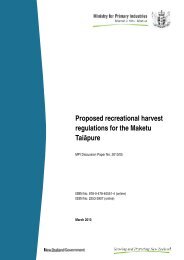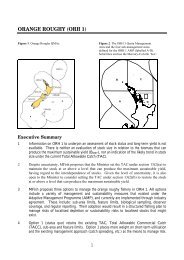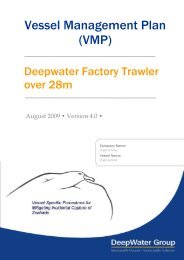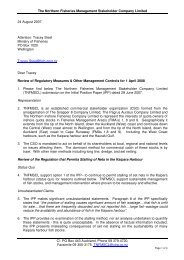Application 124771 - Ministry of Fisheries
Application 124771 - Ministry of Fisheries
Application 124771 - Ministry of Fisheries
You also want an ePaper? Increase the reach of your titles
YUMPU automatically turns print PDFs into web optimized ePapers that Google loves.
MAY 2012 REPORT NO. 2134 | CAWTHRON INSTITUTE<br />
26<br />
enrichment, together with the accumulation <strong>of</strong> debris beneath coastal mussel farms,<br />
increases both the food available for scavengers and habitat heterogeneity. This in<br />
turn can lead to significant increases in the diversity <strong>of</strong> infauna and epibiota (Inglis et<br />
al. 2000, Wong & O’Shea 2011). However, in shell- and sand-dominated benthic<br />
habitats, shifts in epibiota feeding and living on mussels and changes to enrichment<br />
tolerant infauna taxa can occur (Keeley et al. 2010).<br />
Clumps <strong>of</strong> mussels beneath the reference farm sites had been colonised by a range<br />
<strong>of</strong> organisms and provided a reef-like habitat for a variety <strong>of</strong> small fishes and mobile<br />
fauna. Elsewhere, biodeposits beneath mussel farms have been are known to attract<br />
large numbers <strong>of</strong> predatory fish, seastars, crabs, sea urchins and other echinoderms<br />
(Mattsson & Lindén 1983, Kaspar et al. 1985, Cole & Grange 1996). Furthermore,<br />
exclusion <strong>of</strong> trawling by the farm infrastructure also means that species which are<br />
regularly harvested or damaged by trawling in open areas <strong>of</strong> seabed, such as scallops<br />
(Pecten novaezelandiae) and horse mussels (Atrina zealandica), are occasionally<br />
abundant beneath the farms. The extent to which protection for these species is<br />
occurring beneath Coromandel mussel farms however is unknown; scallops were rare<br />
at all sites and occasional beds <strong>of</strong> horse mussels were observed beneath three<br />
reference farm sites and at four control sites.<br />
In general, mussel farming is unlikely to result in irreversible ecological effects<br />
(Forrest 1995, Keeley et al. 2010). Farms placed over mud / silt habitat, as were the<br />
majority <strong>of</strong> farm sites in this study, would likely return to pre-farm conditions within one<br />
to two years <strong>of</strong> farm removal. However, this would depend on the level <strong>of</strong> shell cover<br />
at each site. In extreme cases, banks <strong>of</strong> sediment and shell material up to 2 m high<br />
have been observed beneath Coromandel mussel farms (e.g. C<strong>of</strong>fey 2001), but the<br />
accumulation and extent <strong>of</strong> shell material depends on processes such as water<br />
movement and bioturbation which tends to disperse and modify deposited materials<br />
(Morrisey et al. 2000). Overall, the enrichment effects <strong>of</strong> inshore mussel farms on the<br />
benthic environment in the Coromandel were minor; while shell deposition and related<br />
effects on diversity and abundance <strong>of</strong> epibiota, while considerable, were not<br />
necessarily negative (Keeley et al. 2010).<br />
6.2. Water column effects<br />
The water column properties measured at reference farm sites and control sites were<br />
broadly similar and no clear patterns in differences were observed. Water column<br />
turbidity in the top 1-2 m <strong>of</strong> the water column was similar between farm and control<br />
sites, but farm sites were less turbid between 3-5 m and below 7 m depth. This lower<br />
turbidity may be attributed to the filtering effect <strong>of</strong> the mussels on the farm droppers,<br />
but this effect will depend greatly on the state <strong>of</strong> the tide and the water velocities at<br />
each site, which are known to influence the residence time <strong>of</strong> water passing through<br />
mussel farms (Plew 2011).


